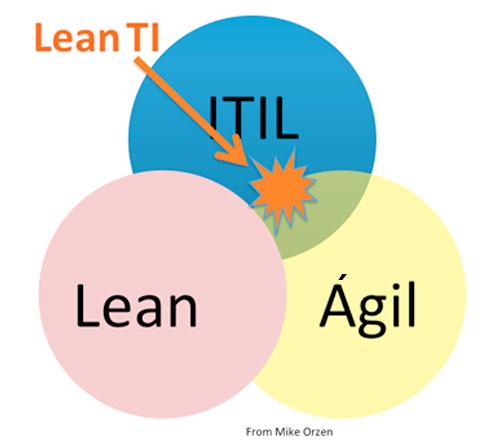Por: Daniel Breston
2819 visualizações
Tempo leitura: 4 min
If you had asked me 30 years ago how lean could help your IT Service Management people, processes, partners and tools, you would have received a blank stare in return.
Eleven data centers, twenty Service Desks, several hundred million in infrastructure or tools purchased, over 300 people managed, ITIL (Information Technology Infrastructure Library) Expert certification obtained along with COBIT (Control Objectives for Information and Related Technology) in those 30 years and I can just about begin to answer that question!
The first time I was asked to lead a lean project, most of the information I could find was manufacturing based. I had been consulting for four years and this new assignment had me start a journey that has introduced me to lean, DevOPS, Kanban, Agile, TOC, BDD/TDD leaders, many of whom are now mentors of mine.
Lean likes asking questions, so my first one is: why do I use ITIL or COBIT? The answer is simple: they are the best-known, IT-focused frameworks giving direction on how to do or lead a technology-based initiative.
These frameworks are not perfect, they are far from being "best practice" and they do not provide enough in terms of defining value, solving problems or continuously improving people. Please don't get me wrong, I believe in ITIL and COBIT, and constantly refer to them as a foundation for coaching improvement in technology use and management. But I personally needed something else.
Lean begins by asking this question (from Michael Ballé or novel The Phoenix Project): if you are not doing IT for the customer, to better your business, or to help your staff, then why are you doing IT? This is a profound question as it makes you wonder why you need the new shiny thing, why it takes six months to launch something no one wants, or why our IT strategy does not support our organization. This is an example of the difference between lean in IT and ITIL or COBIT: lean forces you to think differently and look at things from a different perspective.

TI lean / ITIL / lean / ágil
Courtesy of Mike OrzenThe Phoenix Project by Kim, Behr and Spafford has a wonderful section in which IT management asks each department head what their goals and obstacles are, regardless of IT. Now, instead of planning from technology or their teams to the goal or obstacle, they work backwards. They ask questions: why does what we want to do help? This one question allowed them to discover a better way of collaborating with their business sponsors and supplier partners to create a dynamic strategy that was better, faster, safer and ultimately less costly. Moreover, their people got excited and supportive, which infected the entire organization.
I now regularly ask the following questions, given to me by Michael Ballé (author of Lead with Respect): what is a good day for you, your team and your customer? How do you know? How can you visualize what is happening? How do your teams or suppliers help you every day to address a problem or challenge? How do you help them? No solution discussions, just doing as Stephen Covey suggests: listen with the intent to understand, not to reply.
Lean (or the derivatives known as DevOPS and Agile) has many tools to help the practitioner develop what they are trying to accomplish. Visual displays of targets, or how work should be performed, problem solving techniques, ways to organize what we do, methods to create and align performance measurements and good practices on cost management (no, not job cuts). Lean enables teams to look at a situation, try something, learn from it and try again until satisfied, but within an agreed governance structure.
Look at Flickr, Google, Amazon, Nike but also many banks or healthcare organizations: they have embraced lean IT and use it to help their customers. Are they perfect? Don't they have problems? Of course not, and yes, they have plenty - but the journey of experimenting helps them improve and the involvement of customers, staff and partners makes the improvement cycle faster.
To conclude, lean supports ITIL and COBIT. It helps teams to communicate collaboratively (DevOPS) or create things in a better way (Agile). It enables your ITIL processes, which even Shingo Prize winner Mike Orzen says you should not ignore but instead use to create a standard way of working so you can improve continually. Try it, go and see at the gemba, involve others and see if you can create a better, faster, safer, more productive environment.
Source: Planet Lean
Data da publicação:
07/23/2015
-
 Daniel Breston
Daniel Breston


 Qriosity Limited
Internationally experienced professional with ability to translate the goals and obstacles of an organisation such that technology (people, suppliers, processes and IT) enhance compliance, competitiveness, productivity, customer and staff satisfaction and cost reduction without job loss
Business focus: financial services, utilities, aviation maintenance, gambling, anything that requires IT to be available
Technology leadership: led diverse skilled teams 100+ across multiple global locations 24x7, budget £10m, large-scale transformation
senior IT Service... See more in
https://uk.linkedin.com/in/danielbreston/pt
Qriosity Limited
Internationally experienced professional with ability to translate the goals and obstacles of an organisation such that technology (people, suppliers, processes and IT) enhance compliance, competitiveness, productivity, customer and staff satisfaction and cost reduction without job loss
Business focus: financial services, utilities, aviation maintenance, gambling, anything that requires IT to be available
Technology leadership: led diverse skilled teams 100+ across multiple global locations 24x7, budget £10m, large-scale transformation
senior IT Service... See more in
https://uk.linkedin.com/in/danielbreston/pt